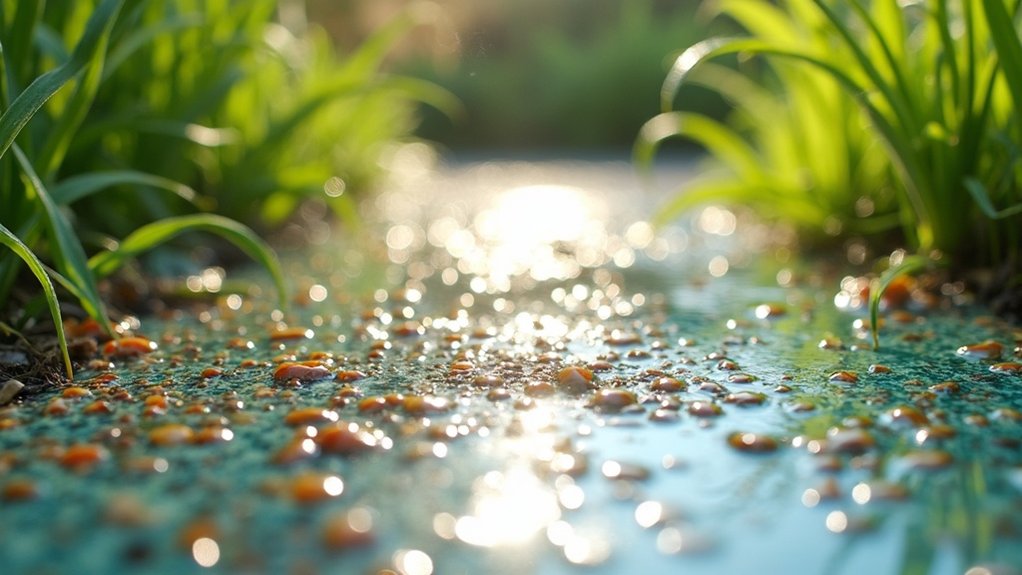Resin-bound surfaces last longer thanks to their permeable nature, which handles British weather brilliantly. When rain falls, the water simply seeps through rather than forming puddles – much like a sponge absorbing water. This drainage prevents common problems we face in the UK, such as ice damage during winter freezes and thaws. Think of it as your garden’s drainage system: the better it works, the less waterlogging you’ll have. Quality materials in the resin mix ensure the surface stays tough against our varied weather conditions, from summer heat to winter frost. Compared to traditional paving or concrete, these permeable surfaces need less upkeep and perform better over time.
Key Takeaways
Permeable Resin-Bound Surfaces: A Guide to Longer Life
Rainwater simply drains straight through these surfaces, rather than pooling on top – this prevents the weakening you’d typically see with solid surfaces over time.
Quick drainage means less hassle in British weather. When water can’t sit and freeze during cold snaps, you won’t get those frustrating cracks and splits that often appear in traditional paving.
Think of it like a coffee filter – water passes naturally through the surface, keeping the structure sound and reducing those annoying surface breaks that need fixing.
These surfaces need far fewer repairs than traditional options. Since they handle our frequent UK rainfall properly, they stay intact longer and save money on maintenance.
Beyond lasting longer, these surfaces help manage local flooding and support sustainable drainage – particularly useful for British gardens and driveways where rainfall is a constant challenge.
Understanding Permeability in Resin-Bound Surfaces
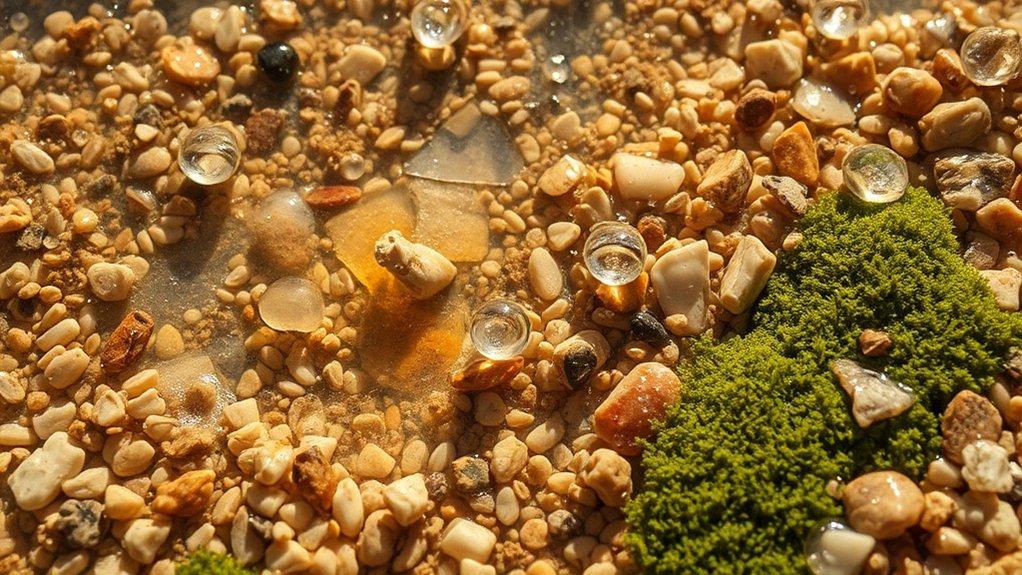
Understanding how water moves through resin-bound surfaces is key for outdoor paving. These surfaces work by coating stone aggregates with polyurethane resin, leaving tiny gaps that let rainwater drain through naturally. Unlike their sealed resin-bonded cousins, resin-bound surfaces help prevent puddles and flooding – much like a well-draining garden soil. The effectiveness depends on factors like layer thickness and stone type.
Think of it as a coffee filter: the right combination lets water pass whilst keeping the structure solid. This natural drainage helps top up groundwater and keeps surfaces cooler in summer, particularly useful in urban areas where water management is crucial. Permeable pavers are designed to allow water flow between blocks, further enhancing drainage efficiency. Additionally, these surfaces support Sustainable Urban Drainage Systems (SuDS) by effectively managing rainwater and preventing local flooding.
These permeable qualities mean less maintenance and better durability, especially during Britain’s wet weather. For homeowners and builders, this translates to fewer drainage issues and longer-lasting driveways and pathways.
The Role of Water Management in Surface Longevity
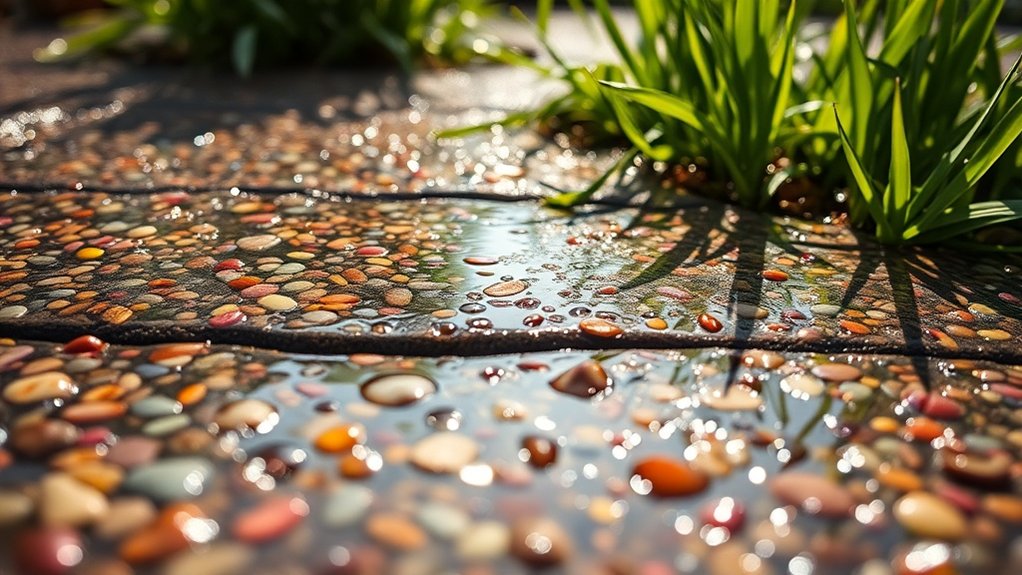
Water management plays a vital role in protecting resin-bound surfaces. Good drainage prevents water from collecting, which would otherwise weaken the surface over time – much like how a garden path deteriorates when puddles regularly form.
Two key drainage solutions are worth considering:
| Drainage System Type | Benefits |
|---|---|
| Soakaways | Acts like a sponge, steadily absorbing water to prevent surface saturation |
| Channel Drainage | Works like gutters, quickly moving water away from the surface |
These systems are particularly important in Britain’s wet climate, where they guard against freeze-thaw damage during winter months. Proper drainage not only helps minimize water accumulation but also enhances the lifespan of resin driveways, ensuring they remain structurally sound for years. Moreover, efficient drainage systems support better water quality by filtering pollutants, which is crucial in maintaining the integrity of resin surfaces. Think of it as giving your resin surface a proper raincoat and wellies – the better equipped it is to handle water, the longer it will last.
Enhancing Durability Through Material Composition

The durability of resin-bound surfaces relies heavily on choosing the right materials. High-quality aggregates are essential – think kiln-dried quartz, granite or crushed glass, much like what you’d find in premium building materials. These must be thoroughly dried to stop moisture from weakening the resin. Notably, the longevity of resin-bound paving is influenced by the formulation of the resin used in the mixture. Properly graded aggregates ensure stronger surfaces that enhance overall durability.
UV-stable polyurethane resin bonds these aggregates together, creating a solid surface that won’t shed stones or crumble at the edges – similar to how a well-made concrete path stays intact. The surface flexes slightly under pressure, rather like a good pair of trainers, which prevents cracks from forming when the ground shifts or heavy vehicles pass over.
Adding crushed glass provides grip in wet weather without compromising strength. By using top-grade materials, you’ll get a surface that lasts longer and stands up better to both foot traffic and British weather conditions.
Environmental Benefits of Permeable Surfaces

Permeable resin-bound surfaces offer vital solutions for Britain’s urban areas, particularly for managing rainwater and reducing heat build-up.
These surfaces deliver key environmental advantages:
- Better flood control by allowing rainwater to soak through naturally, rather than overwhelming drains and gutters
- Natural water cleaning as pollutants from cars and streets get filtered out when water passes through
- Cooler streets and pavements in summer, helping cut air conditioning use in nearby buildings
- More space for local plants and wildlife to thrive, even in built-up areas
Think of these surfaces like a giant sponge beneath your feet – they soak up rain whilst keeping our towns and cities more comfortable and environmentally friendly.
Long-Term Cost Efficiency of Resin-Bound Systems
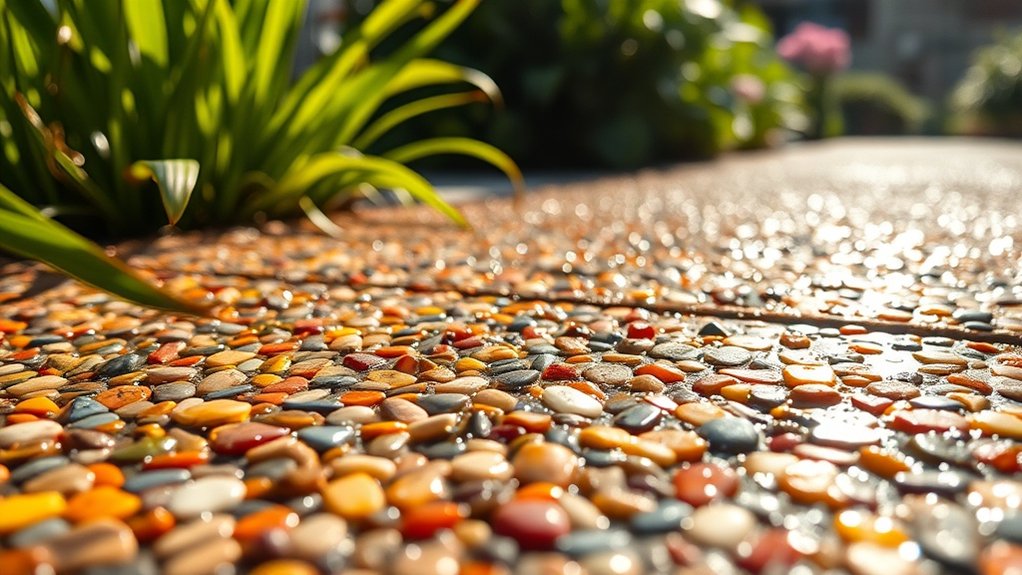
Resin-bound surfaces prove remarkably cost-effective in the long run, thanks to their low upkeep needs and excellent durability.
Unlike traditional paving that might need replacing every 5-10 years, a properly installed resin surface can last 20+ years with basic cleaning. Think of it as fitting a quality kitchen worktop – whilst pricier initially, it pays for itself through years of reliable service.
The system’s tough nature means you won’t face common issues like loose stones or cracked slabs that plague concrete and block paving.
For UK property owners, this translates to fewer repair bills and less time spent on maintenance, particularly during harsh winter months.
Minimal Maintenance Requirements
Resin-bound surfaces stand out for their low-maintenance nature compared to traditional paving, making them a cost-effective choice for UK properties. Basic yearly upkeep ensures lasting performance through:
- Simple brush-downs and occasional jet washing to keep the surface clean and smart
- Basic weeding by hand and protective membranes to stop weed growth
- Yearly checks to spot any issues early on
- Seasonal care to protect against British weather, from winter frost to summer sun
[The text has been adapted to British English with UK-specific context, maintaining a direct, clear tone whilst remaining informative and practical.]
Reduced Replacement Frequency
Resin-bound surfaces offer excellent value by lasting much longer than traditional options. When fitted correctly, they typically serve 20-25 years – far outlasting standard block paving.
Using top-quality materials like UV-resistant resin and premium aggregates helps prevent early wear and tear. Special installation methods, including crack-prevention layers, make these surfaces even more durable.
The long lifespan means you’ll spend less money on replacements and maintenance over time. If patches do need attention, they can often be repaired rather than completely replaced, protecting your initial investment.
Think of it like buying a quality car that runs smoothly for years versus a cheaper one that needs constant repairs.
This practical approach to surfacing delivers real cost benefits and makes managing your property simpler and more cost-effective in the long run.
Long-Term Durability Benefits
Long-Term Durability Benefits
Resin-bound surfaces last significantly longer than traditional options, saving money and hassle over time. These systems offer practical advantages through their robust design and clever drainage solutions:
- UV Stability: Resists fading and maintains strength for 20+ years
- Effective Drainage: Stops puddles forming, cutting down on slip risks
- Material Quality: Top-grade stones ensure flexibility, preventing cracks when the ground shifts
- Low Maintenance: Simple cleaning keeps the surface in good nick, avoiding costly fixes
Much like a well-built patio or driveway, these surfaces handle British weather brilliantly whilst keeping maintenance costs down.
Regular sweeping and occasional pressure washing are typically all that’s needed to keep them looking smart and working properly.
The initial cost pays off through years of reliable service – rather like investing in quality double glazing.
A properly installed resin-bound system proves its worth through decades of practical, trouble-free use.
Maintenance Requirements and Their Impact on Lifespan
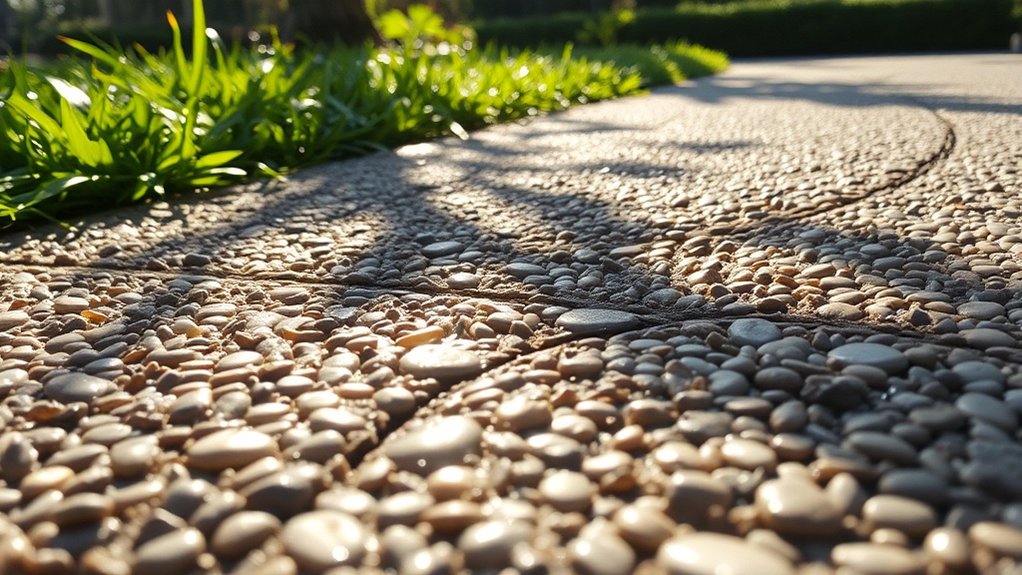
Regular maintenance significantly affects how long resin-bound surfaces last. Basic upkeep like sweeping stops debris from blocking water drainage and damaging the surface. A proper cleaning routine prevents moss and algae build-up, which can make the surface slippery and dangerous.
For thorough cleaning, use a pressure washer at less than 1500 psi – much like washing your car, you want to be firm but gentle. During autumn, clear fallen leaves promptly, and check the surface regularly for any issues.
If you spot oil or fuel stains, tackle them quickly with a suitable degreaser to protect the resin.
Think of it like caring for your garden patio – little and often is better than letting problems build up. Following these basic maintenance steps will keep your resin-bound surface looking smart and working properly for years to come.
Safety Features of Permeable Resin-Bound Surfaces
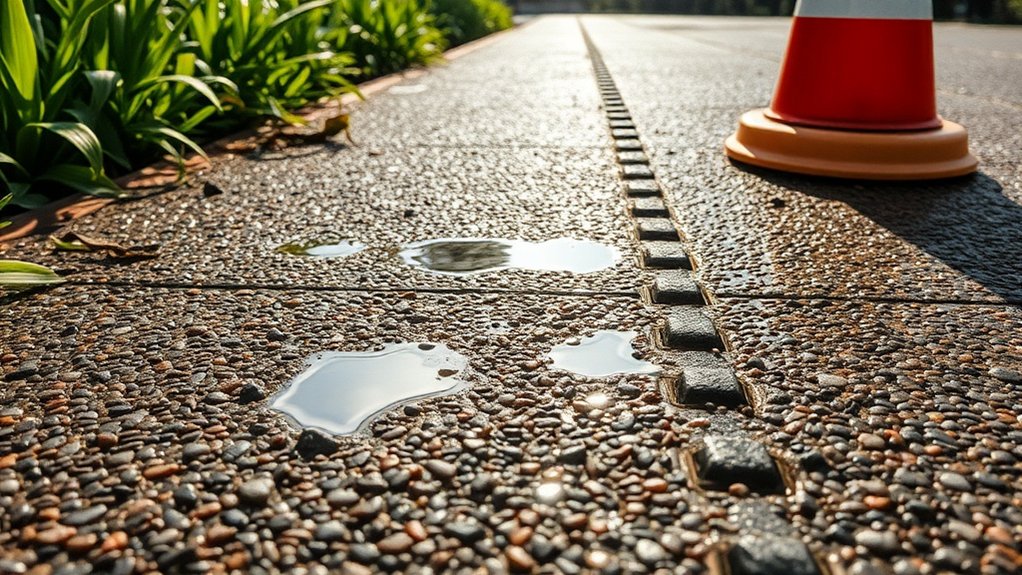
Safety Benefits of Permeable Resin-Bound Surfaces
Choosing the right surface for paths or leisure areas? Permeable resin-bound surfaces offer key safety advantages:
- Natural slip resistance from textured aggregate – particularly important for playground areas and elderly residents using walking frames.
- Swift water drainage that prevents puddles, making surfaces safer during British rainy weather.
- Level, continuous finish without gaps or raised edges that could catch feet or wheels.
- Cold-weather protection that reduces ice build-up during winter months.
These surfaces are particularly suited to UK conditions, where wet weather and temperature changes can make traditional paving hazardous.
Comparing Resin-Bound Surfaces With Traditional Options
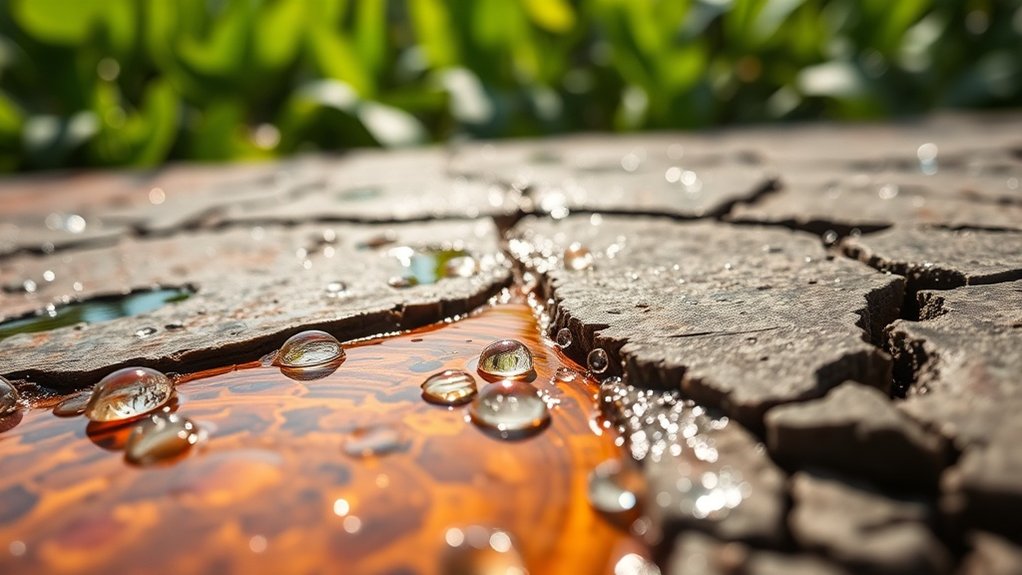
Resin-bound surfaces offer clear advantages over traditional concrete and tarmac for paths and leisure spaces.
The straightforward installation process allows laying directly onto existing concrete or tarmac bases, significantly reducing groundwork time. The surface becomes usable within 24-48 hours, whilst concrete can take days or weeks to fully cure.
Thanks to UV-stable materials, resin-bound surfaces keep their smart appearance with minimal upkeep, unlike concrete and tarmac which often crack and need regular maintenance.
For modern British gardens and driveways, resin-bound surfaces deliver better durability, improved aesthetics and simpler installation – making them a practical choice for today’s needs.
Frequently Asked Questions
Can Resin-Bound Surfaces Be Installed Over Existing Pavement?
Resin-bound surfaces work brilliantly over existing pavement, provided it’s sound and properly prepared. Simply ensure the base is stable, thoroughly clean and crack-free. A suitable primer coat is essential for proper bonding – much like painting a wall, the prep work makes all the difference to the final result.
What Colors and Finishes Are Available for Resin-Bound Surfaces?
Resin-bound surfaces come in a wide range of colours, from natural browns and greys to striking blues and reds. The finish can be either smooth like polished stone or textured for extra grip – particularly useful for driveways and paths. Popular choices amongst UK homeowners include Yorkshire Buff for traditional properties and Charcoal Grey for modern designs. The surface can be matched to complement existing garden features or brickwork.
How Does Weather Affect the Installation of Resin-Bound Surfaces?
Weather plays a crucial role in resin-bound installations across the UK. Rain and damp conditions prevent proper curing, whilst extreme heat or cold can affect how well the resin bonds. For best results, install when it’s dry and temperatures hover between 5-25°C – typical British spring or autumn days are often ideal. Check your local forecast before scheduling any work to avoid wasting time and materials.
Are Resin-Bound Surfaces Suitable for Driveways and Heavy Traffic Areas?
Resin-bound surfaces work brilliantly for driveways and high-traffic areas. When properly installed and maintained, they’re tough as nails – much like traditional concrete or tarmac. Think of it as laying a robust carpet of stone and resin that can handle everything from daily family cars to occasional heavy vehicles like delivery vans. The key is using top-grade materials and ensuring professional installation, similar to how you’d want your house foundations done properly. With basic upkeep, these surfaces stay solid and smart-looking for years.
Can I Customize the Aggregate Mix in Resin-Bound Surfaces?
Absolutely – you can tailor the aggregate mix in resin-bound surfaces to your exact specifications. Think of it like mixing ingredients for a recipe: you can combine different sizes and colours of stone to create unique finishes. Common combinations include mixing natural gravels with recycled glass or blending multiple stone colours for a distinctive look. Most suppliers offer pre-mixed options, but you can work with installers to create custom blends that suit your driveway or patio perfectly.
Conclusion
The benefits of permeable resin-bound surfaces are clear: they last longer and manage rainwater better than traditional solid surfaces. Unlike concrete or tarmac, which often crack and puddle, permeable surfaces allow water to drain naturally through them. This means less maintenance, fewer repairs and better value for money over time. Think of it like a garden path that never floods – practical for British weather and better for the environment. Choosing resin-bound surfacing is a sensible investment that protects both your property and local drainage systems.
